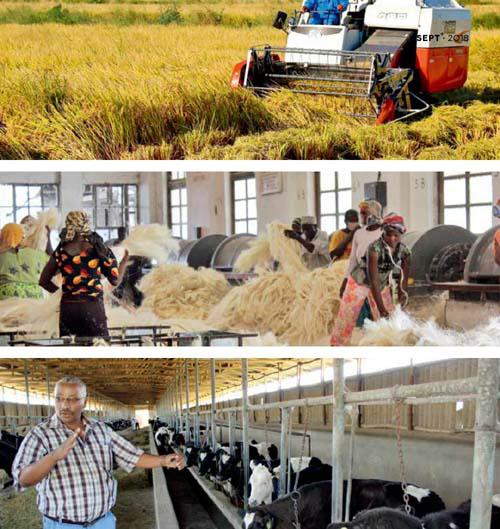Tang Xiaoyang Witness to Africa’s Rise
2018-10-11byHuZhoumeng
by Hu Zhoumeng
Tang Xiaoyang, associate professor at the department of international relations of Tsinghua University, is an experienced scholar on African development and China-Africa relations. Thanks to his travels to nearly 20 African countries over the past decade, Tang published more than 30 academic papers and a book titled China-Africa Economic Diplomacy and Its Implication to the Global Value Chain. Recently, he talked to China Pictorial (CP) about the fast-growing continent and the characteristics of China-Africa cooperation.
CP: What led you to academic research on Africa?
Tang Xiaoyang: I began researching Africa in 2006. At the time, Asian countries such as South Korea and India, and especially China, were looking to invest in Africa. I was living in the United States. Some American consulting firms were interested in why American companies were holding back while Asian businesses were rushing to invest in Africa. So they asked me to do research.
During my research, I found that investment was flowing into Africa because of its rapid development. And the development is comprehensive and complicated, involving multiple facets including politics, economics, culture and society. I studied economics and history as an undergraduate and philosophy in graduate school, so I had special interest in researching such a comprehensive issue with far-reaching influence. The development of Africa is connected to the livelihood of more than a billion people, so I continued focusing on academic research in this area.
CP: You have visited Africa many times for research. Which countries have you been to? Who have you met? What did you research?
Tang: Since 2007, I have visited Africa almost every year and traveled to nearly 20 countries including Egypt, Ethiopia, Nigeria, Kenya, Tanzania, Uganda, Ghana, Angola, Democratic Republic of Congo, South Africa, Zambia, Botswana and Mozambique. Most of the people I met there are government officials and businessmen. My research focuses on economic development in Africa and related social issues and environmental protection.
CP: What is the most prominent change in Africa since your first visit?
Tang: In general, African countries have seen fast growth in the past decade, marked by industrialization. This is illustrated by the increasing numbers of local factories. Many products that used to be imported from overseas can be made locally now. As a result, workers wages are rising, infrastructure is improving and urbanization is accelerating.
CP: What differentiates Chinese support to African development from that provided by other countries?
Tang: As early as in the 1960s and 1970s, China launched several aid projects such as construction of the Tanzania-Zambia Railway in Africa. China has also made similar efforts in recent years to help build hospitals and schools on the continent. However, not through aid, but through even-handed trade that benefits both sides, has China made its biggest contribution to the development of Africa. Such methods have seldom been attempted by other countries. Equal trade between China and Africa boosts the proactivity of both sides and promotes better allocation of resources, while straight aid only fuels passive “receiving” from the African side. Equal trade between China and Africa helps African countries better understand modern economic modes, accumulate more industrialization experience, actively participate in the international division of labor, learn more about management, improve commerce and trade and realize sustainable growth.
CP: Some Chinese enterprises have had trouble adapting to local laws and culture after entering the African market. Are they doing better now?
Tang: These problems frequently happen to new arrivals. I did learn that some Chinese companies in Kenya and Ethiopia were having troubles with employment and environment issues. Thanks to the efforts of Chinese embassies and consulates, chambers of commerce and non-governmental organizations in spreading knowledge of local laws, the situation has improved today. However, Africa is transforming rapidly in many aspects, so it is hard to avoid conflict completely. New business entrants in Africa certainly need time to adapt to the local context.
CP: How does rising anti-globalization and protectionism around the world threaten Africa? How can Africa and China jointly address this challenge?
Tang: Trade protectionism does impact Africa. For instance, Rwanda banned the import of second-hand clothes, and the United States cut its tariff preference for the country in response. In this context, China and African countries should all develop their own markets as much as possible and enhance trade between developing countries. But I believe trade protectionism wont last long. The situation will improve in the near future.